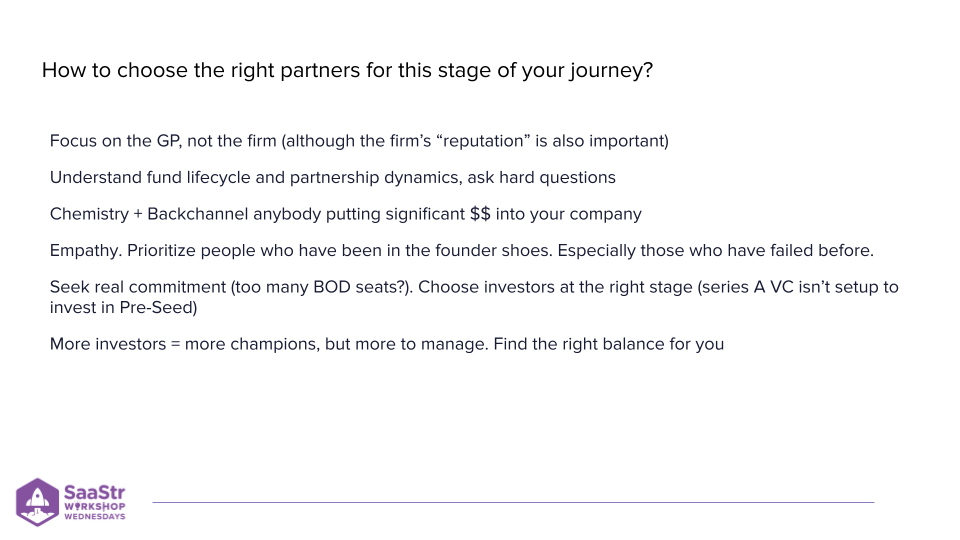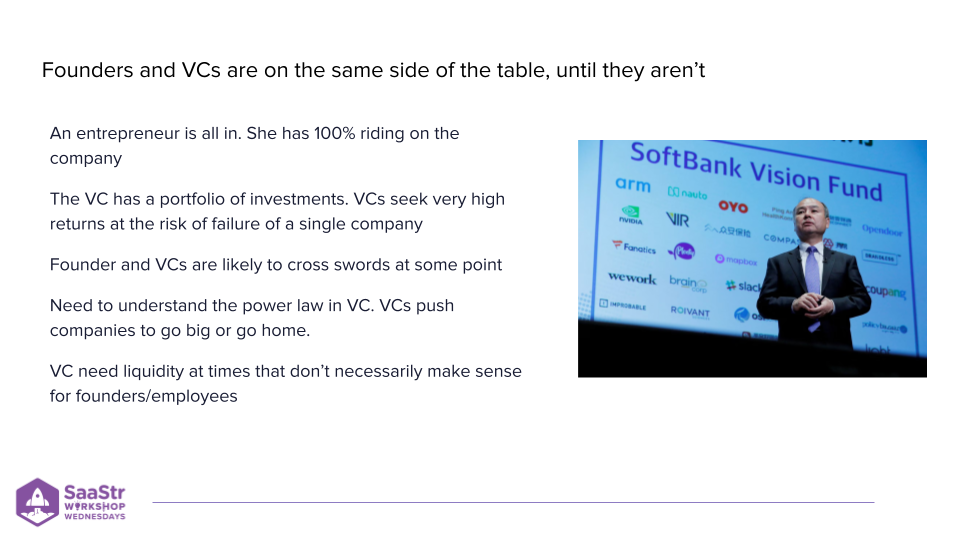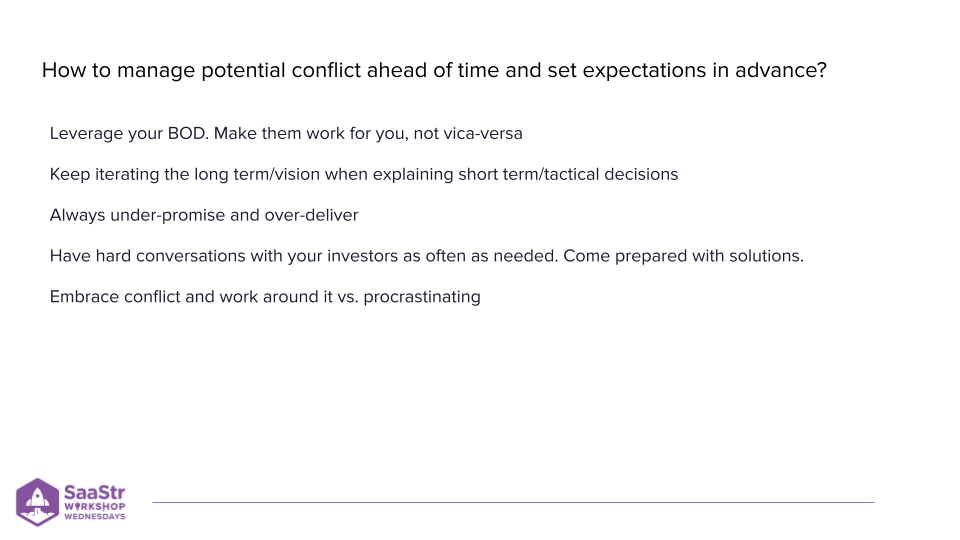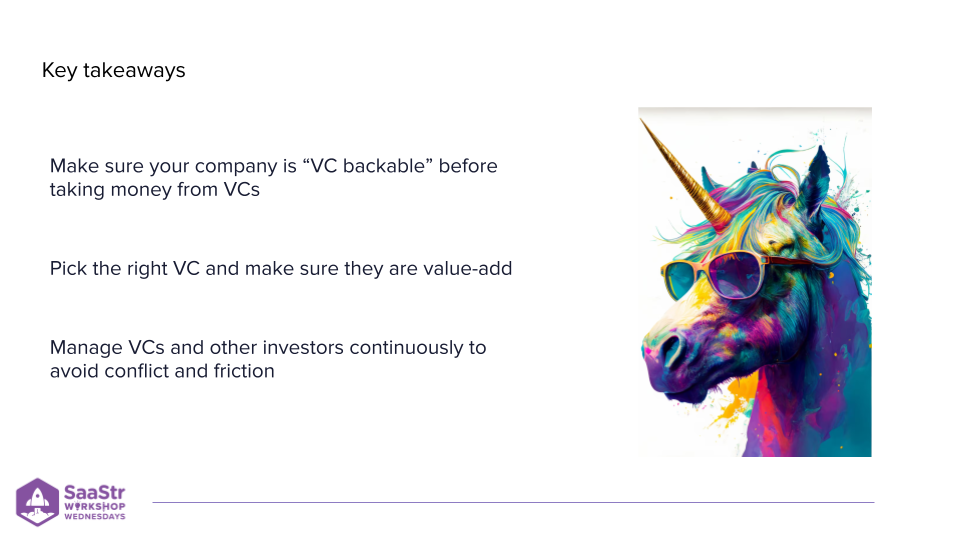One of the most critical relationships an entrepreneur or founder will have in the life of their company is with their investor. A healthy VC-founder relationship can make the difference between company success and failure. So how do you ensure that your investor relationship is a strong one?
In a recent Workshop Wednesday session, Recursive Ventures Founder Itamar Novick shares his secrets to creating a solid bond based on his years of experience in VC and founder and leadership roles.
SaaStr Workshop Wednesdays are LIVE every Wednesday. Sign up for free.
Step One: Evaluate If Your Company is VC- backable.
It may seem a bit jarring to consider, but not every business is a good candidate for investor funding. Novick explains, “Let’s start with some of the basics. This is where some entrepreneurs make mistakes some of the time. The mistake is potentially thinking that every company should be VC-backed. The reality is that most shouldn’t be VC-backed.”
In fact, taking money from VC can lead to conflict if you don’t build a scalable startup that meets an investor’s expectations. To avoid potential conflict down the road, you want to make sure that you and your investor are aligned. So, before pursuing VC funding, Novick recommends that founders ask themselves the following questions:
- If all works well, can I return 20x or more to investors within ten years or less?
- Is my TAM big enough? Novick suggests $5B or more.
- Is there a business dynamic that would make the business massive? This could include a winner-takes-all market, a network effect, or a significant moat in tech or IP.
- Are my co-founders and I in this for the long haul? Can we take risks?
Do I have a core team that can see it through from pre-seed to IPO?

Step Two: Choose the Right Partners For This Stage of Your Journey.
Once you have decided that your business is a good candidate for VC backing, you must choose the right partner. Simply finding a willing investor isn’t good enough; it’s essential that you form a relationship with a partner who is on the same page.
Firstly, it’s critical to focus on the GP first, not on the firm itself. Novick says, “A lot of founders are focused on the firm, and they shouldn’t be. I don’t care that it’s Sequoia; I care about the specific General Partner, the investor that’s going to sit on your board and be there every day to support your company. The firm’s reputation is important as well, but it’s really the individual who’s going to champion you and your company…so you really want to pick the person, not the firm.” But a word of warning; be sure your chosen partner has the experience and a say in what happens at their firm. A clear understanding of the partnership dynamics is vital to your company’s future.
[Pro Tip: Try to seek funds early in their lifecycle so you know they have plenty of capital to deploy and are fully equipped to support you.]
When choosing a partner, you will want to make sure that they have three attributes:
- Chemistry: It seems basic, but you need to get along well with your GP. Try to find someone helpful, easy to communicate with, and who shares your vision.
- Empathy: Prioritize people who have been in the founder’s shoes—especially those who have failed before.
- Commitment: You need a partner who is not only financially invested but actually cares about your company. A highly successful VC may seem great on paper, but they may always be busy and have other priorities. Try to find an experienced partner who values your business and is truly committed.
Finally, over time you will want to bring on more investors since more investors mean you have more champions. However, more investors = more to manage, so find the right balance.

Step Three: Understand That Founders & VCs are on the Same Side of the Table –– Until They Aren’t.
Entrepreneurs are all in when they start a business –– they have 100% riding on the company’s success. This is not the case for investors. A VC has a portfolio of investments and will seek very high returns at the risk of failure of a single company.
Given these differing mindsets, founders and VCs will likely cross swords at some point. So, founders must understand how investors think; VCs push companies to go big or go home, and VCs need liquidity at times that don’t necessarily make sense for company leaders or employees.
As the founder, you may be happy with a longer road to reaching certain milestones, but your investors have their fund lifecycles to consider. They may think of liquidity on a different timeline than a founder would. Being prepared for this scenario in your company’s future is important.

Step Four: Manage Potential Conflict Ahead of Time For Best Results.
To create a productive and positive relationship with your investors, Novick recommends a few tried-and-true strategies:
- Leverage Your Board of Directors: “A lot of folks think that the board is there to manage them or oversee them, right? And that’s true, but really smart entrepreneurs make their board work for them.” So prepare your asks every time there is a board meeting. Find an ally on the board who will help communicate your asks to the other shareholders and leverage the Board’s wisdom so they can help you succeed as a founder.
- Keep the Big Picture at the Forefront: Iterate the long-term vision when explaining the short-term and tactical decisions to your employees, executive teams, and investors.
- Under-Promise, Over-Deliver: Ensure unrealistic expectations won’t haunt you. Wow your VCs with a strong performance you know you can accomplish.
- Have the Hard Conversations: It’s critical to have honest and difficult conversations as often as needed. Come prepared with solutions.
- Embrace Conflict: Don’t avoid conflict altogether because sometimes it can be a good thing for the company. Novick explains, “I think with startups, especially early; you gotta embrace conflict to a certain degree. Conflict actually pushes folks to excel at times.”A certain level of conflict is healthy because it can balance the conversation and bring pros and cons to every decision. If everyone is a yes-man, you may actually end up flying blind.

Key Takeaways
- Only some companies should be VC-backed. Consider your unique business model to determine if a VC is right for you.
- Choose a committed VC who has the experience to support you.
- Understand a VC may naturally have a different timeline and opposite priorities regarding liquidity.
- Don’t run away from conflict; it can be healthy when managed well.

